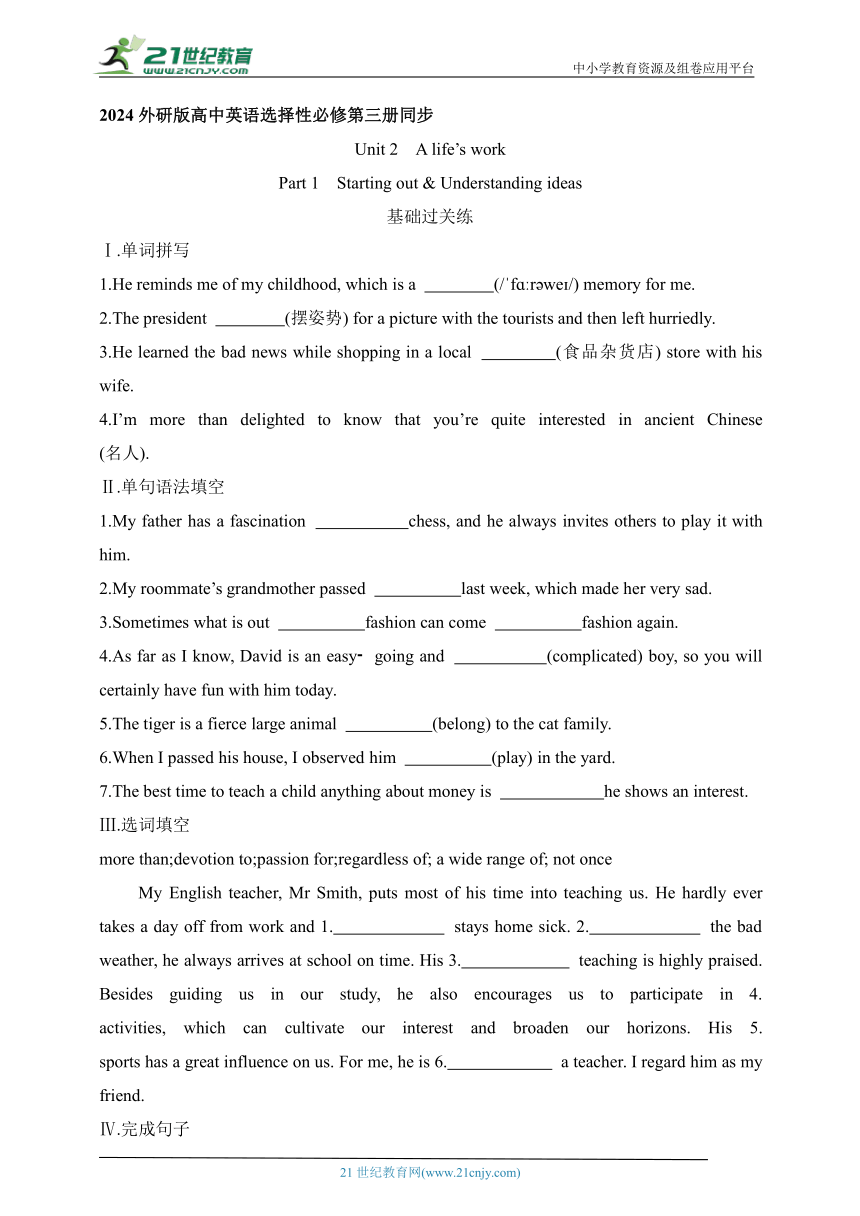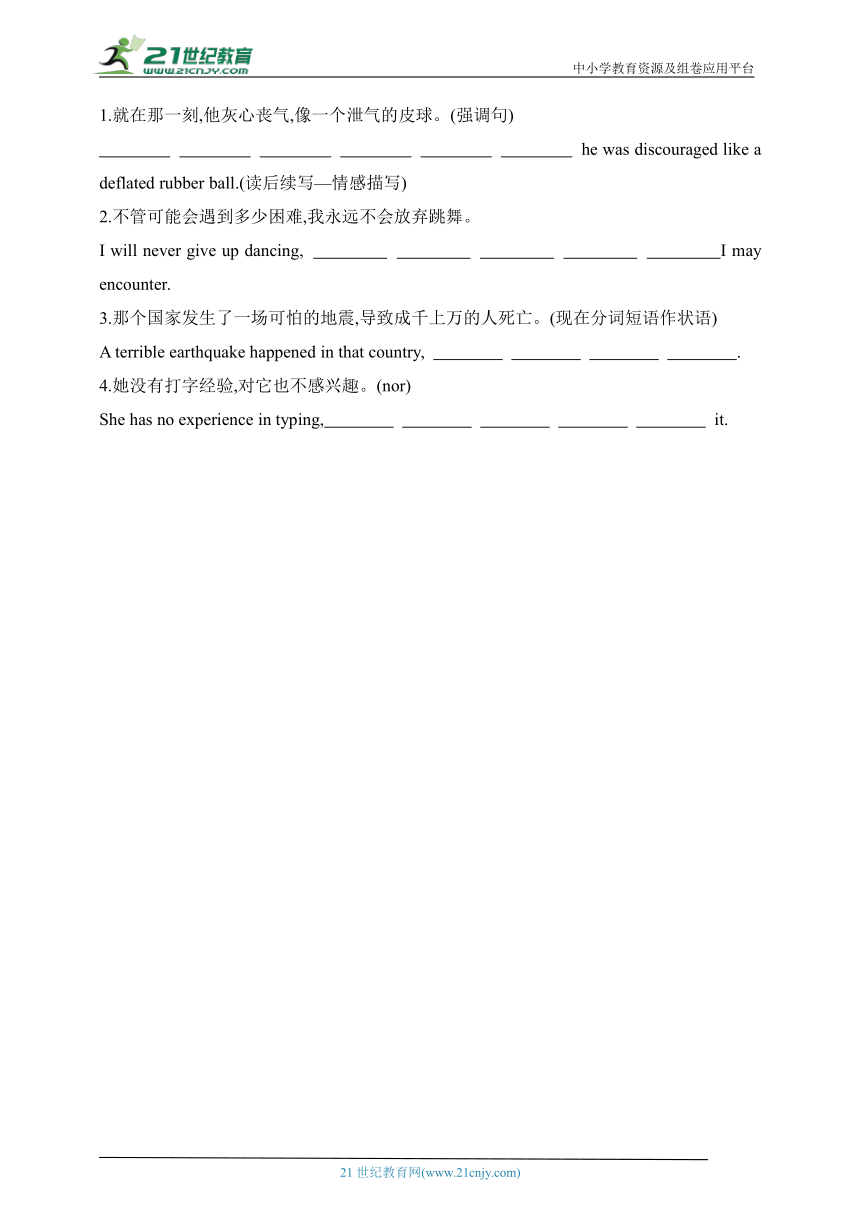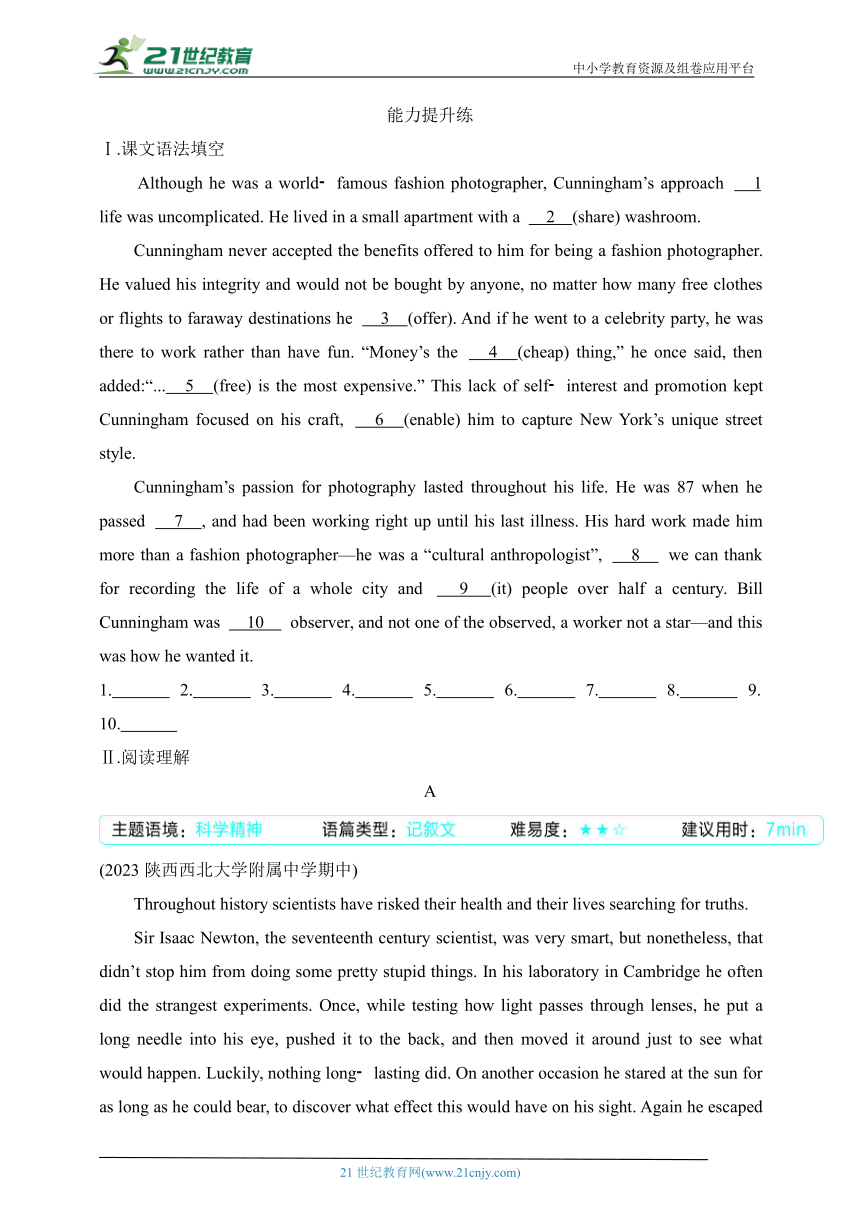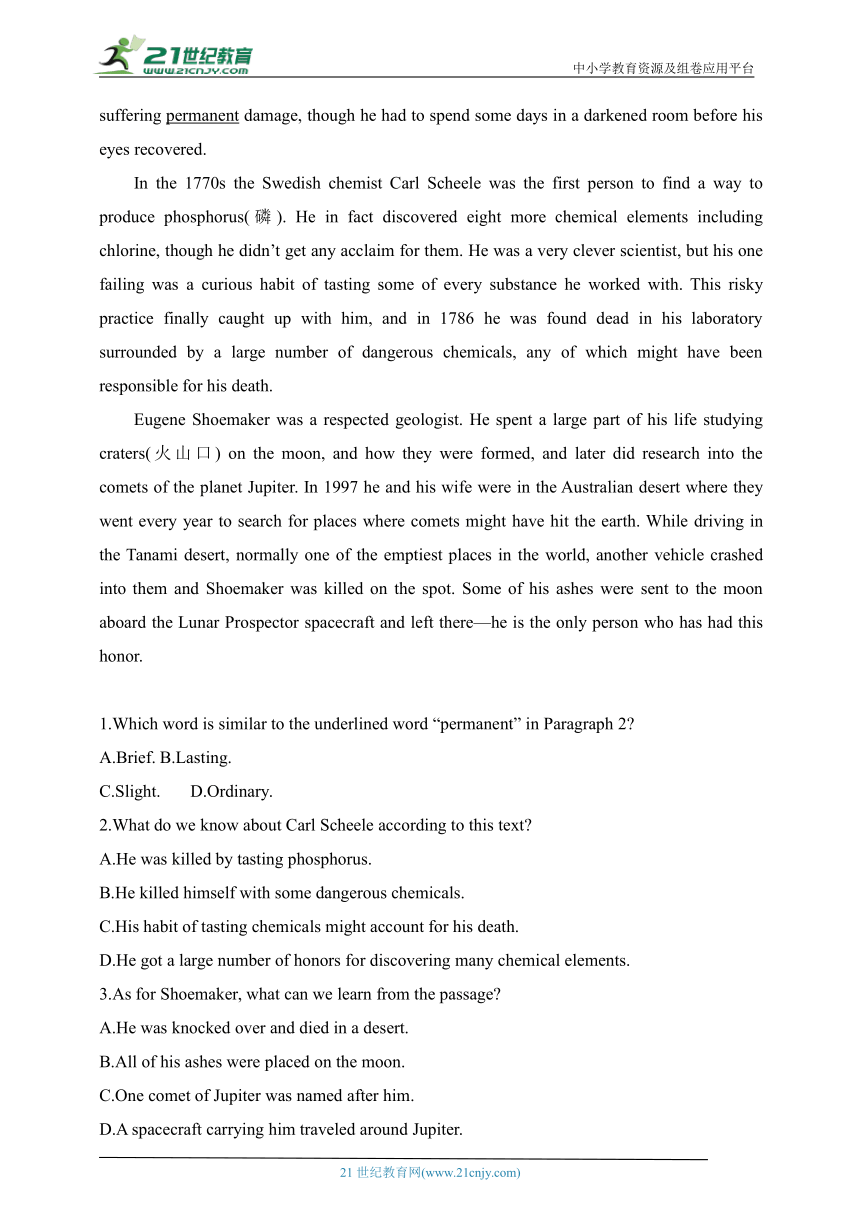2024外研版高中英语选择性必修第三册同步练习--Unit 2 Part 1 Starting out & Understanding ideas(含答案与解析)
文档属性
| 名称 | 2024外研版高中英语选择性必修第三册同步练习--Unit 2 Part 1 Starting out & Understanding ideas(含答案与解析) |

|
|
| 格式 | docx | ||
| 文件大小 | 1022.5KB | ||
| 资源类型 | 试卷 | ||
| 版本资源 | 外研版(2019) | ||
| 科目 | 英语 | ||
| 更新时间 | 2023-11-13 22:35:55 | ||
图片预览





文档简介
中小学教育资源及组卷应用平台
2024外研版高中英语选择性必修第三册同步
Unit 2 A life’s work
Part 1 Starting out & Understanding ideas
基础过关练
Ⅰ.单词拼写
1.He reminds me of my childhood, which is a (/ fɑ r we /) memory for me.
2.The president (摆姿势) for a picture with the tourists and then left hurriedly.
3.He learned the bad news while shopping in a local (食品杂货店) store with his wife.
4.I’m more than delighted to know that you’re quite interested in ancient Chinese (名人).
Ⅱ.单句语法填空
1.My father has a fascination chess, and he always invites others to play it with him.
2.My roommate’s grandmother passed last week, which made her very sad.
3.Sometimes what is out fashion can come fashion again.
4.As far as I know, David is an easy going and (complicated) boy, so you will certainly have fun with him today.
5.The tiger is a fierce large animal (belong) to the cat family.
6.When I passed his house, I observed him (play) in the yard.
7.The best time to teach a child anything about money is he shows an interest.
Ⅲ.选词填空
more than;devotion to;passion for;regardless of; a wide range of; not once
My English teacher, Mr Smith, puts most of his time into teaching us. He hardly ever takes a day off from work and 1. stays home sick. 2. the bad weather, he always arrives at school on time. His 3. teaching is highly praised. Besides guiding us in our study, he also encourages us to participate in 4. activities, which can cultivate our interest and broaden our horizons. His 5. sports has a great influence on us. For me, he is 6. a teacher. I regard him as my friend.
Ⅳ.完成句子
1.就在那一刻,他灰心丧气,像一个泄气的皮球。(强调句)
he was discouraged like a deflated rubber ball.(读后续写—情感描写)
2.不管可能会遇到多少困难,我永远不会放弃跳舞。
I will never give up dancing, I may encounter.
3.那个国家发生了一场可怕的地震,导致成千上万的人死亡。(现在分词短语作状语)
A terrible earthquake happened in that country, .
4.她没有打字经验,对它也不感兴趣。(nor)
She has no experience in typing, it.
能力提升练
Ⅰ.课文语法填空
Although he was a world famous fashion photographer, Cunningham’s approach 1 life was uncomplicated. He lived in a small apartment with a 2 (share) washroom.
Cunningham never accepted the benefits offered to him for being a fashion photographer. He valued his integrity and would not be bought by anyone, no matter how many free clothes or flights to faraway destinations he 3 (offer). And if he went to a celebrity party, he was there to work rather than have fun. “Money’s the 4 (cheap) thing,” he once said, then added:“... 5 (free) is the most expensive.” This lack of self interest and promotion kept Cunningham focused on his craft, 6 (enable) him to capture New York’s unique street style.
Cunningham’s passion for photography lasted throughout his life. He was 87 when he passed 7 , and had been working right up until his last illness. His hard work made him more than a fashion photographer—he was a “cultural anthropologist”, 8 we can thank for recording the life of a whole city and 9 (it) people over half a century. Bill Cunningham was 10 observer, and not one of the observed, a worker not a star—and this was how he wanted it.
1. 2. 3. 4. 5. 6. 7. 8. 9. 10.
Ⅱ.阅读理解
A
(2023陕西西北大学附属中学期中)
Throughout history scientists have risked their health and their lives searching for truths.
Sir Isaac Newton, the seventeenth century scientist, was very smart, but nonetheless, that didn’t stop him from doing some pretty stupid things. In his laboratory in Cambridge he often did the strangest experiments. Once, while testing how light passes through lenses, he put a long needle into his eye, pushed it to the back, and then moved it around just to see what would happen. Luckily, nothing long lasting did. On another occasion he stared at the sun for as long as he could bear, to discover what effect this would have on his sight. Again he escaped suffering permanent damage, though he had to spend some days in a darkened room before his eyes recovered.
In the 1770s the Swedish chemist Carl Scheele was the first person to find a way to produce phosphorus(磷). He in fact discovered eight more chemical elements including chlorine, though he didn’t get any acclaim for them. He was a very clever scientist, but his one failing was a curious habit of tasting some of every substance he worked with. This risky practice finally caught up with him, and in 1786 he was found dead in his laboratory surrounded by a large number of dangerous chemicals, any of which might have been responsible for his death.
Eugene Shoemaker was a respected geologist. He spent a large part of his life studying craters(火山口) on the moon, and how they were formed, and later did research into the comets of the planet Jupiter. In 1997 he and his wife were in the Australian desert where they went every year to search for places where comets might have hit the earth. While driving in the Tanami desert, normally one of the emptiest places in the world, another vehicle crashed into them and Shoemaker was killed on the spot. Some of his ashes were sent to the moon aboard the Lunar Prospector spacecraft and left there—he is the only person who has had this honor.
1.Which word is similar to the underlined word “permanent” in Paragraph 2
A.Brief. B.Lasting.
C.Slight. D.Ordinary.
2.What do we know about Carl Scheele according to this text
A.He was killed by tasting phosphorus.
B.He killed himself with some dangerous chemicals.
C.His habit of tasting chemicals might account for his death.
D.He got a large number of honors for discovering many chemical elements.
3.As for Shoemaker, what can we learn from the passage
A.He was knocked over and died in a desert.
B.All of his ashes were placed on the moon.
C.One comet of Jupiter was named after him.
D.A spacecraft carrying him traveled around Jupiter.
4.What does the text mainly talk about
A.Three great scientists’ famous experiments.
B.Three great scientists’ great achievements.
C.Three great scientists’ sacrifice for truths.
D.Three great scientists’ special honors.
B
(2021北京东城区期末)
Huang Danian, the well known Chinese geophysicist, was born in 1958 in Guangxi, China. As a keen and able student, Huang went to the UK in 1993 to further his studies.
By the time Huang moved back to China in 2008, he had been living and working in the UK for 15 years. He had a good job and life there, but he gave it all up to return home driven by the idea that he needed to contribute to his country. As one of the world’s leading experts in deep earth exploration technology, Huang took up a position at Jilin University, Changchun.
Huang was named lead scientist on China’s deep earth exploration programme, developing advanced cameras that can see through the Earth’s crust (地壳) so that it can be analysed without having to dig into it. He set up an advanced lab, sometimes paying for equipment with his own money. Some described him as a “lunatic” (a “madman”), but this passion and drive enabled Huang to push forwards China’s deep earth exploration technology into a world leading position. Huang’s devotion contributed to China’s lunar probe (月球探测器) YuTu being landed on the moon in 2013 and the launch of the spacecraft Shenzhou 11 and Tiangong 2 in 2016.
Huang’s health also paid the price for his commitment to his work. He began having fainting fits (昏厥) in 2012, but paid them little attention, stating he did not have time to go to see a doctor—his work always came first. In November 2016, Huang fainted and was taken to hospital, where he was diagnosed with cancer. The disease was so advanced that he had just a couple of months to live.
Like the true scientist he was, Huang never gave up, but always tried to push forwards. Even from his hospital bed, he continued his work, writing letters of reference for his colleagues and replying to questions from his students. Huang died in January 2017, aged just 58. More than 800 people attended his funeral to celebrate a life that burned so bright, but was so short.
5.Why did Huang return to China in 2008
A.Because he desired to devote himself to his motherland.
B.Because he had a good job and life here.
C.Because Jilin University offered him a top position.
D.Because he wasn’t satisfied with the life in the UK.
6.What is Paragraph 3 mainly about
A.China’s aerospace development.
B.Huang’s working attitude and style.
C.Huang’s great contributions to China.
D.China’s deep earth exploration technology.
7.What can we learn from the last two paragraphs
A.The working environment caused Huang’s disease.
B.Huang worked continuously despite his poor health.
C.Huang was taken to hospital after he fainted in 2012.
D.A large sum of money was paid to treat Huang’s illness.
8.Which of the following can be used to describe Huang Danian
A.Generous and honest.
B.Passionate and patient.
C.Modest and courageous.
D.Patriotic and committed.
Unit 2 A life’s work
Part 1 Starting out & Understanding ideas
基础过关练
Ⅰ.1.faraway 2.posed 3.grocery 4.celebrities
Ⅱ.1.with/for 考查介词。句意:我爸爸对国际象棋非常着迷,他总是邀请别人和他一起下棋。have a fascination with/for...对……着迷。
2.away 考查固定短语。句意:我室友的祖母上周去世了,这让她很伤心。pass away为固定短语,意为“去世”。
3.of;into 考查介词。句意:有时过时的东西会再次流行起来。be out of fashion意为“过时”;come into fashion意为“开始流行”。
4.uncomplicated 考查词形转换。句意:据我所知,戴维是一个随和、单纯的男孩,所以你今天一定会和他玩得很开心。设空处与easy going并列,作定语修饰boy,因此用形容词,uncomplicated意为“单纯的;不复杂的”,符合语境。
5.belonging 考查现在分词。句意:虎是一种大型猛兽,属于猫科。分析句子结构可知,句中已有谓语动词is,设空处应用非谓语动词。 belong to与其逻辑主语The tiger之间为主动关系,故用现在分词短语作后置定语。
6.playing 考查现在分词。句意:我经过他家时注意到他正在院子里玩。observe sb. doing sth.注意/观察到某人正在做某事。
易错归因 本题易误填play。 observe sb. do sth.意为“注意/观察到某人做了某事”,与此处语境不符。
7.when 考查表语从句。句意:教孩子任何有关钱的知识的最佳时机是当他表现出兴趣的时候。分析句子结构可知,“ he shows an interest”是表语从句,设空处引导表语从句,充当从句的时间状语,故填when。
Ⅲ.1.not once 2.Regardless of 3.devotion to 4.a wide range of 5.passion for 6.more than
Ⅳ.1.It was at the moment that
2.no matter how many difficulties
3.causing thousands of deaths
4.nor is she interested in
能力提升练
Ⅰ.1.to 考查介词。one’s approach to...意为“某人……的方式”。
2.shared 考查过去分词。设空处作定语修饰名词washroom,washroom与动词share之间是被动关系,故此处应用过去分词形式,故填shared。
3.was offered 考查动词的时态、语态及主谓一致。根据语境可知此处表示过去的事,应用一般过去时,且he与offer之间为被动关系,因此用一般过去时的被动语态。此处主语是he,谓语动词应用第三人称单数形式,故填was offered。
4.cheapest 考查形容词最高级。设空处与下文中的the most expensive形成对比,且由设空处前的定冠词the可知,此处应用形容词的最高级形式。
5.freedom 考查名词。设空处作主语,表示“自由”,应用名词freedom。
6.enabling 考查现在分词。设空处为分词作状语,enable与其逻辑主语之间为主动关系,故应用现在分词形式。
7.away 考查副词。pass away意为“去世”。
8.who/whom 考查关系代词。分析句子结构可知,此处为非限制性定语从句,先行词指人,关系词在从句中作宾语,故用who或whom引导非限制性定语从句。
9.its 考查代词。设空处修饰名词people,应用形容词性物主代词its,意为“它的”,此处指“这个城市的”。
10.an 考查冠词。此处表泛指,且observer以元音音素开头,故填不定冠词an。
Ⅱ.A
◎语篇解读 本文是一篇记叙文。文章主要讲述了Isaac Newton、Carl Scheele以及Eugene Shoemaker三位科学家冒着健康和生命危险寻找真理的事迹。
1.B 词义猜测题。第二段列举了Isaac Newton的两个实验,在第一个实验中,为了测试光线如何穿过透镜,他把一根长针插进眼睛,推到后面,然后移动它,看看会发生什么,结果是“Luckily, nothing long lasting did.”。在第二个实验中,他久久地盯着太阳,想看看这对他的视力有什么影响,根据画线词所在句“Again he escaped suffering...before his eyes recovered.”可知,Isaac Newton不得不在一间黑暗的房间里待上几天,直到他的眼睛恢复,说明他的眼睛避免了遭受永久性的伤害。结合本句中的“Again”可知,permanent与前文中的“long lasting”对应,意为“永久的”。故选B。
2.C 推理判断题。根据第三段中的“He was a very clever scientist, but his one failing was a curious habit of tasting some of every substance he worked with... responsible for his death. (他是一个非常聪明的科学家,但他的一个缺点是有一个好奇的习惯,即对他所研究的每一种物质都要尝一些。这种危险的做法终于产生了问题。1786年,他被发现死在实验室里,周围有大量的危险化学品,任何一种化学品都有可能导致他的死亡。)”可推测,Carl Scheele喜欢品尝化学物质的习惯可能是他死亡的原因。故选C。
易错归因 本题易错选B项。根据第三段最后一句可推测,Carl Scheele由于品尝了有毒的化学物质而死亡,但文中并未提到他用危险的化学物质自杀,故排除B项。
3.A 细节理解题。根据最后一段中的“While driving in the Tanami desert, normally one of the emptiest places in the world, another vehicle crashed into them and Shoemaker was killed on the spot.”可知,当Shoemaker和他的妻子在塔纳米沙漠开车时,另一辆车撞上了他们,Shoemaker当场死亡。故选A。
4.C 主旨大意题。根据第一段“Throughout history scientists have risked their health and their lives searching for truths.”并结合文章主要讲述了Isaac Newton、Carl Scheele以及Eugene Shoemaker三位科学家冒着健康和生命危险寻找真理的事迹可知,文章主要讲了三位伟大的科学家为真理所做的牺牲。故选A。
【高频词汇】 1.recover v.恢复健康;康复 2.on the spot 当场;当下;在现场 3.honor n.荣誉 4.account for解释;说明;是……的原因
【熟词生义】 catch up with 产生(曾设法避免的)问题
长难句
原句 This risky practice finally caught up with him, and in 1786 he was found dead in his laboratory surrounded by a large number of dangerous chemicals, any of which might have been responsible for his death.
分析 本句是由and连接的并列复合句。第一个分句“This risky practice finally caught up with him”为简单句;第二个分句为主从复合句,“surrounded by a large number of dangerous chemicals”为过去分词短语作后置定语,修饰laboratory,“any of which might have been responsible for his death”为非限制性定语从句,修饰先行词chemicals。
译文 这种冒险的做法最终产生了问题,1786年,他被发现死在他的实验室里,周围有大量危险的化学品,其中任何一种化学品都可能导致他的死亡。
B
◎语篇解读 这是一篇记叙文。文章介绍了中国著名地球物理学家黄大年的生平及他为祖国做出的贡献。
5.A 细节理解题。根据第二段中的“but he gave it all up to return home driven by the idea that he needed to contribute to his country”可知,黄大年从英国回到祖国是因为他渴望为国家的发展贡献自己的力量。故选A。
易错归因 本题易错选C选项。第二段最后一句虽提到了C选项中的“Jilin University offered him a top position”,但这不是黄大年回国的原因,而是他回国后才发生的事情,属于“答非所问”。
定势纠偏 不能因为选项内容与文章内容相符就认为是正确选项,一定要认真比对该选项所说内容是否与题干所问问题有关。
6.C 主旨大意题。根据第三段末句“Huang’s devotion contributed to...in 2016.”并结合本段其他内容可知,第三段介绍了他开发的先进相机可以穿透地壳,这样就可以在不深入地壳的情况下进行分析,他还建立了一个先进的实验室,正是这种激情和动力使黄大年把中国的地球深部探测技术推向了世界领先的地位。由此可知第三段主要介绍了黄大年对中国做出的巨大贡献。故选C。
7.B 细节理解题。由倒数第二段第二句“He began having fainting fits(昏厥)...came first.”及最后一段第二句“Even from his hospital bed...his students.”可知,他虽然患病住院但仍坚持工作。故选B。
8.D 推理判断题。根据第二段第二句“He had a good job...his country.”可知,黄大年放弃英国的优厚待遇回国为祖国发展尽力,由此可知他是爱国的。综合最后两段介绍的他患重病但仍坚持工作可知他是敬业的、投入的。D项“(爱国的且投入的)”能非常准确地形容黄大年。故选D。
易错归因 本题易错选A、B两项。A项中的Generous(大方的)和B项中的Passionate(狂热的)在文中都有体现,但A项中的honest(诚实的)和B项中的patient(耐心的)并未涉及,故排除。
【高频词汇】 1.contribute to 为……做贡献/捐款/撰稿;是……的原因之一;有助于 2.advanced adj.先进的;高级的;晚期的 3.set up 创建 4.equipment n.设备;装备 5.passion n.激情;热情;酷爱 6.devotion n.献身;奉献 7.be diagnosed with 被诊断患有
【熟词生义】 1.further v.促进;推进 2.take up 接受;开始从事 3.name v.任命 4.develop v.研制;开发
长难句
原句 Huang was named lead scientist on China’s deep earth exploration programme, developing advanced cameras that can see through the Earth’s crust(地壳) so that it can be analysed without having to dig into it.
分析 本句是主从复合句。“developing...dig into it”是现在分词短语作伴随状语;该短语中“that can see...dig into it”是that引导的定语从句,修饰cameras;该定语从句中“so that...dig into it”是so that引导的目的状语从句。
译文 黄大年被任命为中国地球深部探测计划的首席科学家,开发可以透视地壳的先进摄像机,这样不用将地壳挖开就能分析它。
21世纪教育网 www.21cnjy.com 精品试卷·第 2 页 (共 2 页)
21世纪教育网(www.21cnjy.com)
2024外研版高中英语选择性必修第三册同步
Unit 2 A life’s work
Part 1 Starting out & Understanding ideas
基础过关练
Ⅰ.单词拼写
1.He reminds me of my childhood, which is a (/ fɑ r we /) memory for me.
2.The president (摆姿势) for a picture with the tourists and then left hurriedly.
3.He learned the bad news while shopping in a local (食品杂货店) store with his wife.
4.I’m more than delighted to know that you’re quite interested in ancient Chinese (名人).
Ⅱ.单句语法填空
1.My father has a fascination chess, and he always invites others to play it with him.
2.My roommate’s grandmother passed last week, which made her very sad.
3.Sometimes what is out fashion can come fashion again.
4.As far as I know, David is an easy going and (complicated) boy, so you will certainly have fun with him today.
5.The tiger is a fierce large animal (belong) to the cat family.
6.When I passed his house, I observed him (play) in the yard.
7.The best time to teach a child anything about money is he shows an interest.
Ⅲ.选词填空
more than;devotion to;passion for;regardless of; a wide range of; not once
My English teacher, Mr Smith, puts most of his time into teaching us. He hardly ever takes a day off from work and 1. stays home sick. 2. the bad weather, he always arrives at school on time. His 3. teaching is highly praised. Besides guiding us in our study, he also encourages us to participate in 4. activities, which can cultivate our interest and broaden our horizons. His 5. sports has a great influence on us. For me, he is 6. a teacher. I regard him as my friend.
Ⅳ.完成句子
1.就在那一刻,他灰心丧气,像一个泄气的皮球。(强调句)
he was discouraged like a deflated rubber ball.(读后续写—情感描写)
2.不管可能会遇到多少困难,我永远不会放弃跳舞。
I will never give up dancing, I may encounter.
3.那个国家发生了一场可怕的地震,导致成千上万的人死亡。(现在分词短语作状语)
A terrible earthquake happened in that country, .
4.她没有打字经验,对它也不感兴趣。(nor)
She has no experience in typing, it.
能力提升练
Ⅰ.课文语法填空
Although he was a world famous fashion photographer, Cunningham’s approach 1 life was uncomplicated. He lived in a small apartment with a 2 (share) washroom.
Cunningham never accepted the benefits offered to him for being a fashion photographer. He valued his integrity and would not be bought by anyone, no matter how many free clothes or flights to faraway destinations he 3 (offer). And if he went to a celebrity party, he was there to work rather than have fun. “Money’s the 4 (cheap) thing,” he once said, then added:“... 5 (free) is the most expensive.” This lack of self interest and promotion kept Cunningham focused on his craft, 6 (enable) him to capture New York’s unique street style.
Cunningham’s passion for photography lasted throughout his life. He was 87 when he passed 7 , and had been working right up until his last illness. His hard work made him more than a fashion photographer—he was a “cultural anthropologist”, 8 we can thank for recording the life of a whole city and 9 (it) people over half a century. Bill Cunningham was 10 observer, and not one of the observed, a worker not a star—and this was how he wanted it.
1. 2. 3. 4. 5. 6. 7. 8. 9. 10.
Ⅱ.阅读理解
A
(2023陕西西北大学附属中学期中)
Throughout history scientists have risked their health and their lives searching for truths.
Sir Isaac Newton, the seventeenth century scientist, was very smart, but nonetheless, that didn’t stop him from doing some pretty stupid things. In his laboratory in Cambridge he often did the strangest experiments. Once, while testing how light passes through lenses, he put a long needle into his eye, pushed it to the back, and then moved it around just to see what would happen. Luckily, nothing long lasting did. On another occasion he stared at the sun for as long as he could bear, to discover what effect this would have on his sight. Again he escaped suffering permanent damage, though he had to spend some days in a darkened room before his eyes recovered.
In the 1770s the Swedish chemist Carl Scheele was the first person to find a way to produce phosphorus(磷). He in fact discovered eight more chemical elements including chlorine, though he didn’t get any acclaim for them. He was a very clever scientist, but his one failing was a curious habit of tasting some of every substance he worked with. This risky practice finally caught up with him, and in 1786 he was found dead in his laboratory surrounded by a large number of dangerous chemicals, any of which might have been responsible for his death.
Eugene Shoemaker was a respected geologist. He spent a large part of his life studying craters(火山口) on the moon, and how they were formed, and later did research into the comets of the planet Jupiter. In 1997 he and his wife were in the Australian desert where they went every year to search for places where comets might have hit the earth. While driving in the Tanami desert, normally one of the emptiest places in the world, another vehicle crashed into them and Shoemaker was killed on the spot. Some of his ashes were sent to the moon aboard the Lunar Prospector spacecraft and left there—he is the only person who has had this honor.
1.Which word is similar to the underlined word “permanent” in Paragraph 2
A.Brief. B.Lasting.
C.Slight. D.Ordinary.
2.What do we know about Carl Scheele according to this text
A.He was killed by tasting phosphorus.
B.He killed himself with some dangerous chemicals.
C.His habit of tasting chemicals might account for his death.
D.He got a large number of honors for discovering many chemical elements.
3.As for Shoemaker, what can we learn from the passage
A.He was knocked over and died in a desert.
B.All of his ashes were placed on the moon.
C.One comet of Jupiter was named after him.
D.A spacecraft carrying him traveled around Jupiter.
4.What does the text mainly talk about
A.Three great scientists’ famous experiments.
B.Three great scientists’ great achievements.
C.Three great scientists’ sacrifice for truths.
D.Three great scientists’ special honors.
B
(2021北京东城区期末)
Huang Danian, the well known Chinese geophysicist, was born in 1958 in Guangxi, China. As a keen and able student, Huang went to the UK in 1993 to further his studies.
By the time Huang moved back to China in 2008, he had been living and working in the UK for 15 years. He had a good job and life there, but he gave it all up to return home driven by the idea that he needed to contribute to his country. As one of the world’s leading experts in deep earth exploration technology, Huang took up a position at Jilin University, Changchun.
Huang was named lead scientist on China’s deep earth exploration programme, developing advanced cameras that can see through the Earth’s crust (地壳) so that it can be analysed without having to dig into it. He set up an advanced lab, sometimes paying for equipment with his own money. Some described him as a “lunatic” (a “madman”), but this passion and drive enabled Huang to push forwards China’s deep earth exploration technology into a world leading position. Huang’s devotion contributed to China’s lunar probe (月球探测器) YuTu being landed on the moon in 2013 and the launch of the spacecraft Shenzhou 11 and Tiangong 2 in 2016.
Huang’s health also paid the price for his commitment to his work. He began having fainting fits (昏厥) in 2012, but paid them little attention, stating he did not have time to go to see a doctor—his work always came first. In November 2016, Huang fainted and was taken to hospital, where he was diagnosed with cancer. The disease was so advanced that he had just a couple of months to live.
Like the true scientist he was, Huang never gave up, but always tried to push forwards. Even from his hospital bed, he continued his work, writing letters of reference for his colleagues and replying to questions from his students. Huang died in January 2017, aged just 58. More than 800 people attended his funeral to celebrate a life that burned so bright, but was so short.
5.Why did Huang return to China in 2008
A.Because he desired to devote himself to his motherland.
B.Because he had a good job and life here.
C.Because Jilin University offered him a top position.
D.Because he wasn’t satisfied with the life in the UK.
6.What is Paragraph 3 mainly about
A.China’s aerospace development.
B.Huang’s working attitude and style.
C.Huang’s great contributions to China.
D.China’s deep earth exploration technology.
7.What can we learn from the last two paragraphs
A.The working environment caused Huang’s disease.
B.Huang worked continuously despite his poor health.
C.Huang was taken to hospital after he fainted in 2012.
D.A large sum of money was paid to treat Huang’s illness.
8.Which of the following can be used to describe Huang Danian
A.Generous and honest.
B.Passionate and patient.
C.Modest and courageous.
D.Patriotic and committed.
Unit 2 A life’s work
Part 1 Starting out & Understanding ideas
基础过关练
Ⅰ.1.faraway 2.posed 3.grocery 4.celebrities
Ⅱ.1.with/for 考查介词。句意:我爸爸对国际象棋非常着迷,他总是邀请别人和他一起下棋。have a fascination with/for...对……着迷。
2.away 考查固定短语。句意:我室友的祖母上周去世了,这让她很伤心。pass away为固定短语,意为“去世”。
3.of;into 考查介词。句意:有时过时的东西会再次流行起来。be out of fashion意为“过时”;come into fashion意为“开始流行”。
4.uncomplicated 考查词形转换。句意:据我所知,戴维是一个随和、单纯的男孩,所以你今天一定会和他玩得很开心。设空处与easy going并列,作定语修饰boy,因此用形容词,uncomplicated意为“单纯的;不复杂的”,符合语境。
5.belonging 考查现在分词。句意:虎是一种大型猛兽,属于猫科。分析句子结构可知,句中已有谓语动词is,设空处应用非谓语动词。 belong to与其逻辑主语The tiger之间为主动关系,故用现在分词短语作后置定语。
6.playing 考查现在分词。句意:我经过他家时注意到他正在院子里玩。observe sb. doing sth.注意/观察到某人正在做某事。
易错归因 本题易误填play。 observe sb. do sth.意为“注意/观察到某人做了某事”,与此处语境不符。
7.when 考查表语从句。句意:教孩子任何有关钱的知识的最佳时机是当他表现出兴趣的时候。分析句子结构可知,“ he shows an interest”是表语从句,设空处引导表语从句,充当从句的时间状语,故填when。
Ⅲ.1.not once 2.Regardless of 3.devotion to 4.a wide range of 5.passion for 6.more than
Ⅳ.1.It was at the moment that
2.no matter how many difficulties
3.causing thousands of deaths
4.nor is she interested in
能力提升练
Ⅰ.1.to 考查介词。one’s approach to...意为“某人……的方式”。
2.shared 考查过去分词。设空处作定语修饰名词washroom,washroom与动词share之间是被动关系,故此处应用过去分词形式,故填shared。
3.was offered 考查动词的时态、语态及主谓一致。根据语境可知此处表示过去的事,应用一般过去时,且he与offer之间为被动关系,因此用一般过去时的被动语态。此处主语是he,谓语动词应用第三人称单数形式,故填was offered。
4.cheapest 考查形容词最高级。设空处与下文中的the most expensive形成对比,且由设空处前的定冠词the可知,此处应用形容词的最高级形式。
5.freedom 考查名词。设空处作主语,表示“自由”,应用名词freedom。
6.enabling 考查现在分词。设空处为分词作状语,enable与其逻辑主语之间为主动关系,故应用现在分词形式。
7.away 考查副词。pass away意为“去世”。
8.who/whom 考查关系代词。分析句子结构可知,此处为非限制性定语从句,先行词指人,关系词在从句中作宾语,故用who或whom引导非限制性定语从句。
9.its 考查代词。设空处修饰名词people,应用形容词性物主代词its,意为“它的”,此处指“这个城市的”。
10.an 考查冠词。此处表泛指,且observer以元音音素开头,故填不定冠词an。
Ⅱ.A
◎语篇解读 本文是一篇记叙文。文章主要讲述了Isaac Newton、Carl Scheele以及Eugene Shoemaker三位科学家冒着健康和生命危险寻找真理的事迹。
1.B 词义猜测题。第二段列举了Isaac Newton的两个实验,在第一个实验中,为了测试光线如何穿过透镜,他把一根长针插进眼睛,推到后面,然后移动它,看看会发生什么,结果是“Luckily, nothing long lasting did.”。在第二个实验中,他久久地盯着太阳,想看看这对他的视力有什么影响,根据画线词所在句“Again he escaped suffering...before his eyes recovered.”可知,Isaac Newton不得不在一间黑暗的房间里待上几天,直到他的眼睛恢复,说明他的眼睛避免了遭受永久性的伤害。结合本句中的“Again”可知,permanent与前文中的“long lasting”对应,意为“永久的”。故选B。
2.C 推理判断题。根据第三段中的“He was a very clever scientist, but his one failing was a curious habit of tasting some of every substance he worked with... responsible for his death. (他是一个非常聪明的科学家,但他的一个缺点是有一个好奇的习惯,即对他所研究的每一种物质都要尝一些。这种危险的做法终于产生了问题。1786年,他被发现死在实验室里,周围有大量的危险化学品,任何一种化学品都有可能导致他的死亡。)”可推测,Carl Scheele喜欢品尝化学物质的习惯可能是他死亡的原因。故选C。
易错归因 本题易错选B项。根据第三段最后一句可推测,Carl Scheele由于品尝了有毒的化学物质而死亡,但文中并未提到他用危险的化学物质自杀,故排除B项。
3.A 细节理解题。根据最后一段中的“While driving in the Tanami desert, normally one of the emptiest places in the world, another vehicle crashed into them and Shoemaker was killed on the spot.”可知,当Shoemaker和他的妻子在塔纳米沙漠开车时,另一辆车撞上了他们,Shoemaker当场死亡。故选A。
4.C 主旨大意题。根据第一段“Throughout history scientists have risked their health and their lives searching for truths.”并结合文章主要讲述了Isaac Newton、Carl Scheele以及Eugene Shoemaker三位科学家冒着健康和生命危险寻找真理的事迹可知,文章主要讲了三位伟大的科学家为真理所做的牺牲。故选A。
【高频词汇】 1.recover v.恢复健康;康复 2.on the spot 当场;当下;在现场 3.honor n.荣誉 4.account for解释;说明;是……的原因
【熟词生义】 catch up with 产生(曾设法避免的)问题
长难句
原句 This risky practice finally caught up with him, and in 1786 he was found dead in his laboratory surrounded by a large number of dangerous chemicals, any of which might have been responsible for his death.
分析 本句是由and连接的并列复合句。第一个分句“This risky practice finally caught up with him”为简单句;第二个分句为主从复合句,“surrounded by a large number of dangerous chemicals”为过去分词短语作后置定语,修饰laboratory,“any of which might have been responsible for his death”为非限制性定语从句,修饰先行词chemicals。
译文 这种冒险的做法最终产生了问题,1786年,他被发现死在他的实验室里,周围有大量危险的化学品,其中任何一种化学品都可能导致他的死亡。
B
◎语篇解读 这是一篇记叙文。文章介绍了中国著名地球物理学家黄大年的生平及他为祖国做出的贡献。
5.A 细节理解题。根据第二段中的“but he gave it all up to return home driven by the idea that he needed to contribute to his country”可知,黄大年从英国回到祖国是因为他渴望为国家的发展贡献自己的力量。故选A。
易错归因 本题易错选C选项。第二段最后一句虽提到了C选项中的“Jilin University offered him a top position”,但这不是黄大年回国的原因,而是他回国后才发生的事情,属于“答非所问”。
定势纠偏 不能因为选项内容与文章内容相符就认为是正确选项,一定要认真比对该选项所说内容是否与题干所问问题有关。
6.C 主旨大意题。根据第三段末句“Huang’s devotion contributed to...in 2016.”并结合本段其他内容可知,第三段介绍了他开发的先进相机可以穿透地壳,这样就可以在不深入地壳的情况下进行分析,他还建立了一个先进的实验室,正是这种激情和动力使黄大年把中国的地球深部探测技术推向了世界领先的地位。由此可知第三段主要介绍了黄大年对中国做出的巨大贡献。故选C。
7.B 细节理解题。由倒数第二段第二句“He began having fainting fits(昏厥)...came first.”及最后一段第二句“Even from his hospital bed...his students.”可知,他虽然患病住院但仍坚持工作。故选B。
8.D 推理判断题。根据第二段第二句“He had a good job...his country.”可知,黄大年放弃英国的优厚待遇回国为祖国发展尽力,由此可知他是爱国的。综合最后两段介绍的他患重病但仍坚持工作可知他是敬业的、投入的。D项“(爱国的且投入的)”能非常准确地形容黄大年。故选D。
易错归因 本题易错选A、B两项。A项中的Generous(大方的)和B项中的Passionate(狂热的)在文中都有体现,但A项中的honest(诚实的)和B项中的patient(耐心的)并未涉及,故排除。
【高频词汇】 1.contribute to 为……做贡献/捐款/撰稿;是……的原因之一;有助于 2.advanced adj.先进的;高级的;晚期的 3.set up 创建 4.equipment n.设备;装备 5.passion n.激情;热情;酷爱 6.devotion n.献身;奉献 7.be diagnosed with 被诊断患有
【熟词生义】 1.further v.促进;推进 2.take up 接受;开始从事 3.name v.任命 4.develop v.研制;开发
长难句
原句 Huang was named lead scientist on China’s deep earth exploration programme, developing advanced cameras that can see through the Earth’s crust(地壳) so that it can be analysed without having to dig into it.
分析 本句是主从复合句。“developing...dig into it”是现在分词短语作伴随状语;该短语中“that can see...dig into it”是that引导的定语从句,修饰cameras;该定语从句中“so that...dig into it”是so that引导的目的状语从句。
译文 黄大年被任命为中国地球深部探测计划的首席科学家,开发可以透视地壳的先进摄像机,这样不用将地壳挖开就能分析它。
21世纪教育网 www.21cnjy.com 精品试卷·第 2 页 (共 2 页)
21世纪教育网(www.21cnjy.com)
